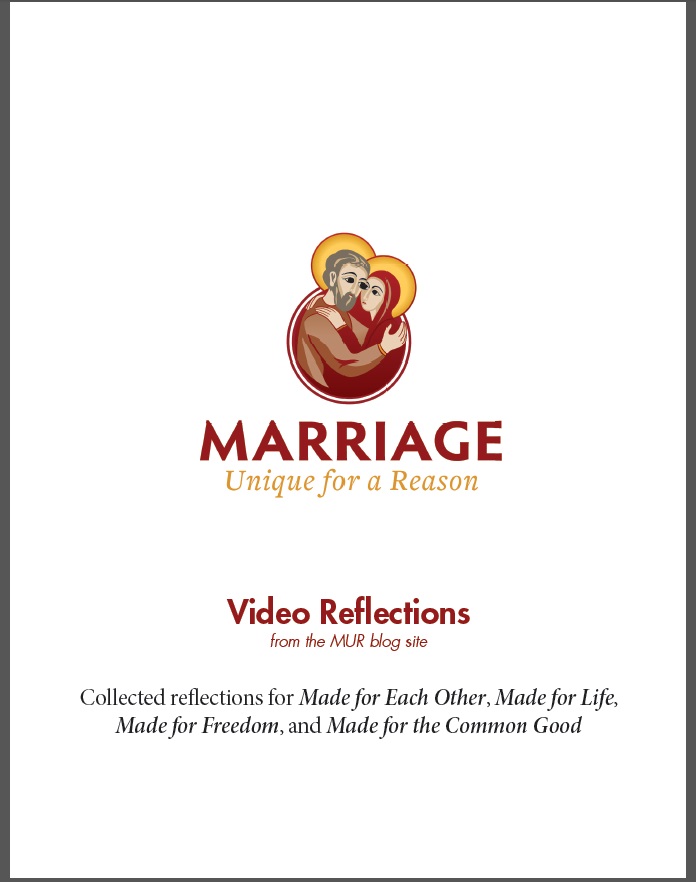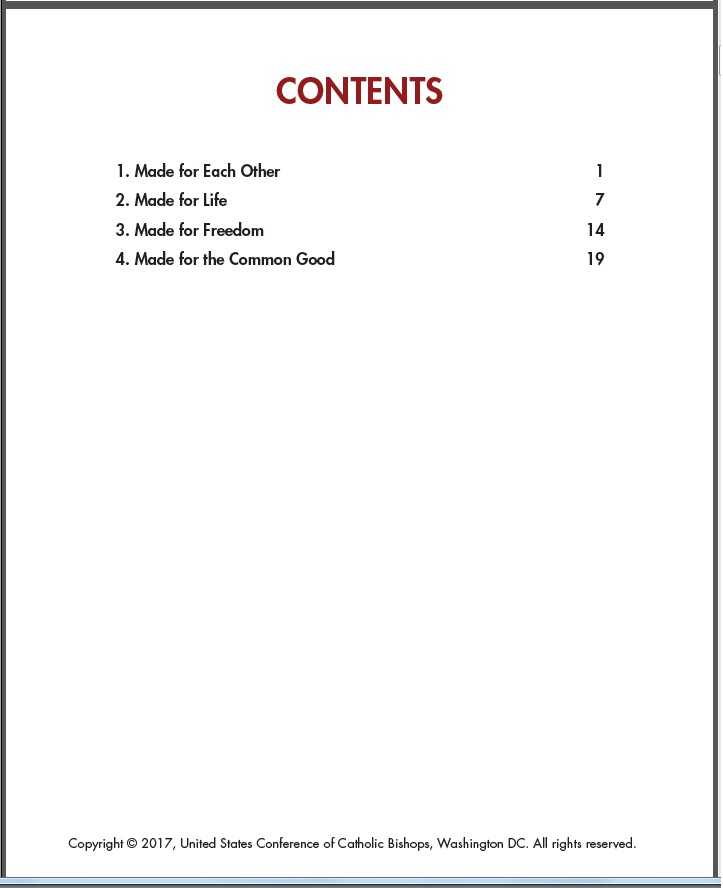PDF of Video Reflections
 We have compiled the posted blog reflections on our MUR videos into PDF form for your use. Please use and share!
We have compiled the posted blog reflections on our MUR videos into PDF form for your use. Please use and share!
Download HERE today!
Archive
Made for Freedom: Gloria Purvis on Diversity
Today’s clip features Gloria Purvis. Gloria converted to the Catholic faith at the age of twelve after a profound experience before the Eucharist. In this clip, Gloria notes that the current trend of celebrating diversity notably ignores Christians as valuable members of a diverse society.
It seems that all beliefs are acceptable, and even celebrated, in the workplace unless (or until) these beliefs appear to challenge the current ethos of sexual “freedom.” If diversity is a true value, it requires tolerance, which is a virtue that applies especially when you disagree with the other.
Opportunity
Are you tolerant of others’ opinions on things, even when you think that they are wrong on an important issue? This does not mean compromising the truth or your own beliefs; it simply means respecting the person and his or her ability to reason and to come to a different conclusion than yours. St. Therese practiced not arguing about anything unless she felt that there was a moral obligation to do so. This is hard for some of us (the author possibly most of all!) and a good practice of self-control.
Archive
Made for Freedom: Kellie Fiedorek on Religious Freedom in the Courts
America is somewhat infamous for her people’s litigious attitudes: we will, it seems, sue anyone over anything. Think about all the common-sense warnings on items that you buy: somewhere, someone pointed out that without that warning, the company could be sued.
Lawsuits are not always, or usually, the best way to solve disagreements. As Jesus taught, it is best if we can work our differences out “on the way to court” (see Mt 5:25). While a lawsuit may sometimes seem to be the only way to address a wrong that has been done, it is not the normal course of action. Today’s clip from Made for Freedom features an attorney for the Alliance Defending Freedom, Kellie Fiedorek, who is speaking about her work in defending Christians and others who are being sued for refusing services which would compromise their beliefs. One may reasonably ask whether it is appropriate to sue someone over these incidents.
People might disagree about whether creating a flower arrangement or a wedding cake for a same-sex couple’s ceremony is cooperating in an immoral activity, but surely we can all agree that a person should never be forced by the government to do something that goes against their conscience.
At times of crisis and war, America has upheld the rights of conscientious objectors to serve in ways other than in battle. The government may choose to fight, but they do not force someone to fight if it goes against their conscience. One could make the same case here. The government has redefined marriage in the law. It has decreed that two men or two women can be united in the same way as a man and a woman. This goes against the religious beliefs of many people in our society. Why should they be coerced into going along with it?
Opportunity
Take some time to become more familiar with one of the people affected by a lawsuit over the redefinition of marriage or sexuality:
Archive
Made for Freedom: Peter Range on Adoption
Peter Range shares a bit of his experience in adoption ministry in today’s clip:
Peter talks about a child being “grafted into a family with a mother and a father.” When you choose to “graft” something on to something else, you want to make sure that the thing you are grafting onto is healthy and robust. In gardening, grafting is done to strengthen the plant, to give it the best chance of surviving. In adoption, a birth mother is placing her child lovingly into the arms of those she believes and trusts will give her child the best chance at thriving.
As Peter notes, when an agency is looking to place a child into a new “forever” home, they are looking for the best environment for the child; they would not want to place a child into a home that is lacking a fundamental element that the child needs, or that features something that child should not be exposed to. (As a simple example, an adoption agency would not be doing its job well if they placed a child with severe pet allergies into a home where the parents have 3 dogs and 5 cats!) In this way, Catholic adoption agencies seek to place children in homes with married couples, whenever possible. This is so that the child will grow up with a mother and a father; a man and woman who will step in to offer the child what their natural mother and father could not.
Opportunity
Consider the experience of adoption and the testimony of adopted children to their interest, or lack thereof, in meeting their birth parents. How can the Church accompany these children and their parents?
Archive
Made for Freedom: Alana Newman on Third-Party Reproduction
“The fact that connects us all, as human beings, is the fact that everybody comes from a mother and a father.”
Alana Newman speaks in today’s clip with a forceful rhetorical statement, that if we tweak this fundamental fact of human existence, we are “robbing [someone] of their humanity.” She speaks from personal experience of the pain of a child who is denied the right to know her father. Did you know that children who are born of third-party reproduction[1] do not have any rights to know who their natural father (or mother) is? Alana speaks about this later in the video, saying that when she learned that the sperm donor was Polish, she flew to Poland so that she could know something of her heritage in that way. Her experience led Alana to start a project called Anonymous Us, a story collective of children from third-party reproduction. She also put a number of these stories into a book that was recently published.
Opportunity
Today, take the opportunity to think about what knowing your natural parents, and thus their families as well, has meant to you; or, if you have been unable to know one or both of them, consider this loss and how you have been able to overcome it. Think of a single parent that you know, and ask yourself if there is a way for you to help them as they raise their child, particularly if you can act as a mentor in the place of a missing parent. While you can never replace that loss, you could help the child navigate it.
[1] Third-party reproduction is the term used to describe when the reproductive faculties or material of a third person (whether this person is known to the person/couple or not) are used in some way to “make” a child for the other person/couple. The most common form of third-party reproduction is artificial insemination, in which a man “donates” his sperm (he is paid for this), which is then used to fertilize a woman’s ovum. Other forms use a “donated” egg or even an embryo of another couple.
Archive
Made for Freedom: Ryan Anderson on Marriage Across Cultures
In today’s clip, Ryan Anderson addresses three truths that should serve to undergird society’s upholding of the unique relationship of marriage. They are:
- Anthropological (men and women are distinct and complementary)
- Biological (procreation requires both a man and a woman)
- Social (that children deserve both a mother and a father)
Ryan notes that these truths have been cross-culturally acknowledged. People from many different times and places recognized that the relationship between a man and a woman, the only one that naturally leads to the birth and upbringing of children, is unique and worthy of protection. The natural family is not something that society made up; rather, laws and culture recognized it as a fundamentally human reality. We are each born to a mother and a father, and we deserve to have a relationship with those people who brought us into existence.
While this is a basic truth of humanity, the understanding of it as such has been gradually chipped away through societal changes. Increasing non-marital childbearing, divorce rates, separation between sex and procreation through either (on the one hand) contraception or abortion or (on the other) in vitro fertilization, scientific experiments on embryonic human life, etc. have all served to dull our sense of the relationship that should exist between men, women, and their children. Despite any thoughts or feelings that two people subjectively may have about their relationship, when they come together in a sexual act, they are participating in that-which-creates-life. And at that point, when life is created from an act that they chose, the man and woman are no longer the only people involved or the only people who get to define their relationship. They have a responsibility to the person they created by virtue of the simple fact that they created them. The child did not choose to come into existence, and he or she becomes the recipient of whatever heritage his or her parents offer. When this heritage is stability and a dedication to the child’s growth and education, it is no more than what the child deserves. Marriage provides justice for the child.
Opportunity
If you have children, spend a little time today in prayer recalling that they are gifts. Think about how they were not owed to you and that you did not “deserve” them or have a “right” to them. If you do not have children, pay attention today to the way that others speak of their children and seek to remind them that they are gifts.
Another idea is to tell a family story (or two) at lunch about your parents and some of their interactions, and/or how you seek to be a good mother or father to your children.
Archive
Made for Freedom: Fr. Nolan on Religious Freedom
Did you know that we have smaller segments available of Made for Freedom? If you follow us on Facebook or Twitter, you have probably seen them. Here’s Fr. Nolan speaking about religious freedom:
Fr. Nolan says, “Just because our faith is personal doesn’t mean it’s private.” What is the distinction between “personal” and “private”? Americans tend either to overemphasize or under-emphasize privacy—we will post our various whims and even our meals on social media, not seeming to care that this is public, but then we may get shy about sharing our views about controversial issues in a public forum.
Faith is deeply personal. It is a gift of grace that directs a person’s whole life. How, then, could it not be visible or clear in public?
The reason the Catholic faith, in particular, cannot be relegated to the “private” sphere, where it’s no one else’s business, is twofold. First, we have been enjoined by Christ to “Go, therefore and make disciples of all nations, baptizing them in the name of the Father, and of the Son, and of the holy Spirit, teaching them to observe all that I have commanded you” (Mt 28:19-20). Secondly, we know that, “faith of itself, if it does not have works, is dead” (Jas 2:17). We cannot sit comfortably in our church pews, recite the creed, and then go “incognito” into the world. Doing so would mean ceasing to be who we are called to be.
Opportunity
Today, challenge yourself to share your faith with another person, in “public”. People need to know that their neighbors and co-workers value their faith, even if those people do not share it. How else will they know that it’s something valuable that should be protected?
This doesn’t have to be complicated. Is it a beautiful day outside? “It’s so pretty out, God is good!” Did you have a hard morning at work? “I need some serious grace to get through this afternoon.”


